Duration:
7 months
Campus Availability:
- Phoenix, AZ
Upcoming Start Dates:
Jul. 11, 2025 & Aug. 8, 2025
START TRAINING FOR YOUR ELECTRICAL CAREER TODAY
The Electrical Applications program at RSI trains students in the fundamentals of the following:
- Mechanical and electrical principles
- Residential and commercial wiring applications
- Voice, video and data cabling systems
- The application on motors, lighting, devices and various types of transformers
RSI students will receive a Diploma after successfully completing our electrician school program.
Learn the Skills You Need to Become an Electrician
In as little as 7 months, you’ll have the electrical training necessary to become an entry-level electrician. Here are some of the career opportunities that await you:
- Residential Electrician
- Commercial Electrician
- Industrial Electrician
- Maintenance Electrician
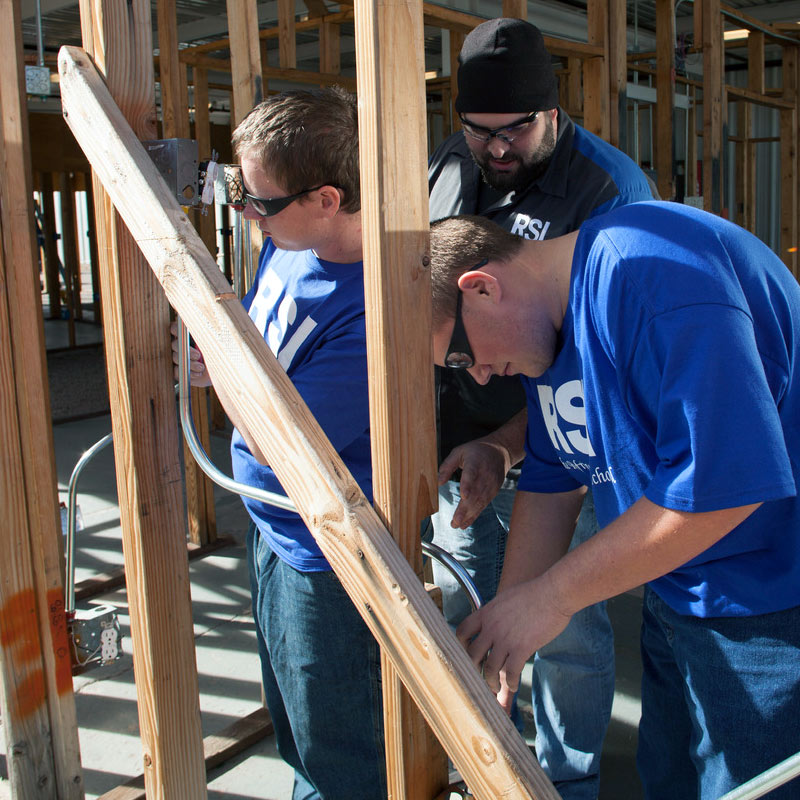
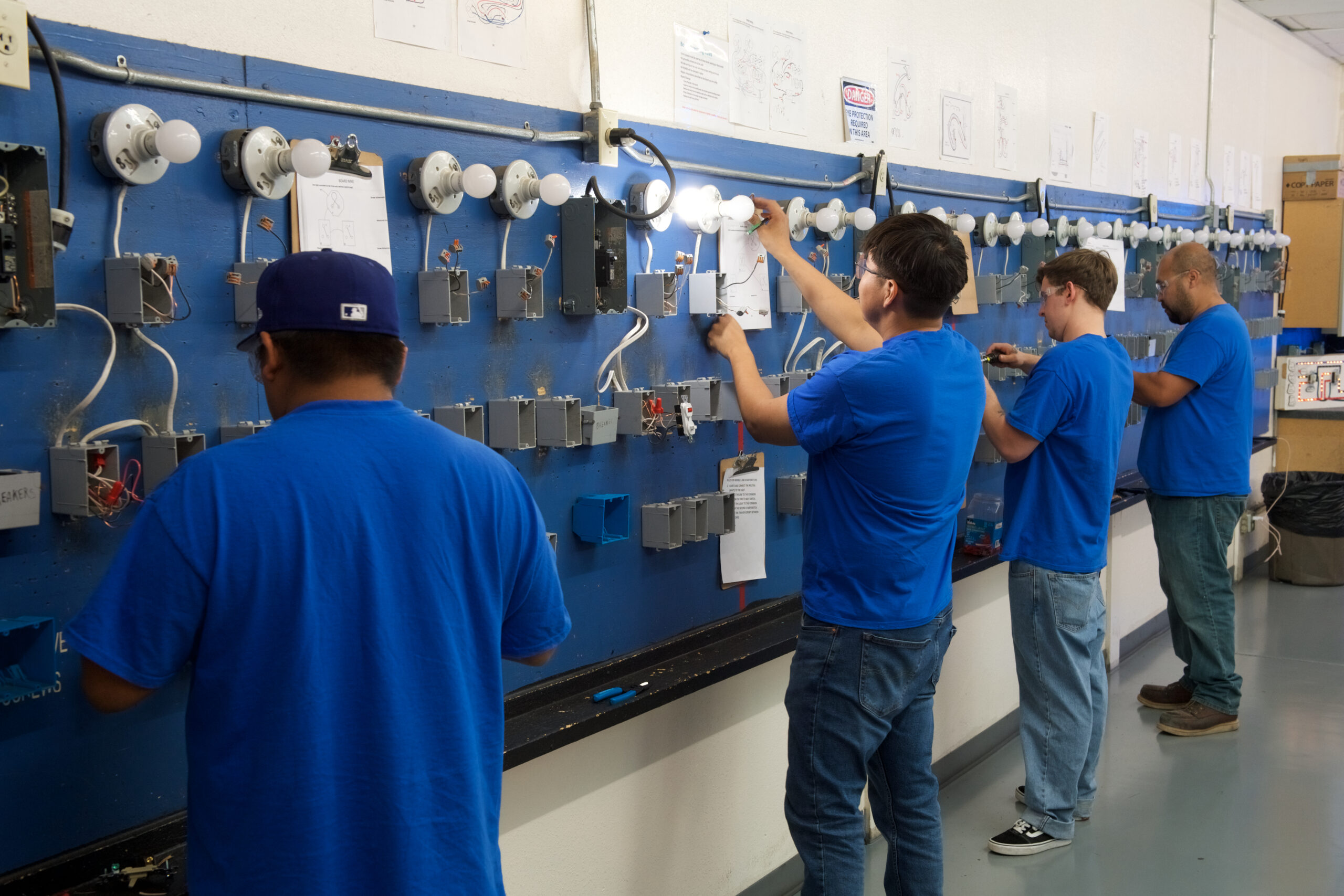
Weekend Classes Now Available
Weekend classes are now available for the Electrical Applications program at The Refrigeration School in Phoenix! Perfect for students with weekday commitments, this flexible training option helps you build the skills for a career in the electrical industry—without interrupting your busy schedule.
Employment is Expected to Grow for Electricians in the US by 80,200 Jobs by 2033!**
Flexible Class Schedules
Morning, afternoon, evening & weekend classes available
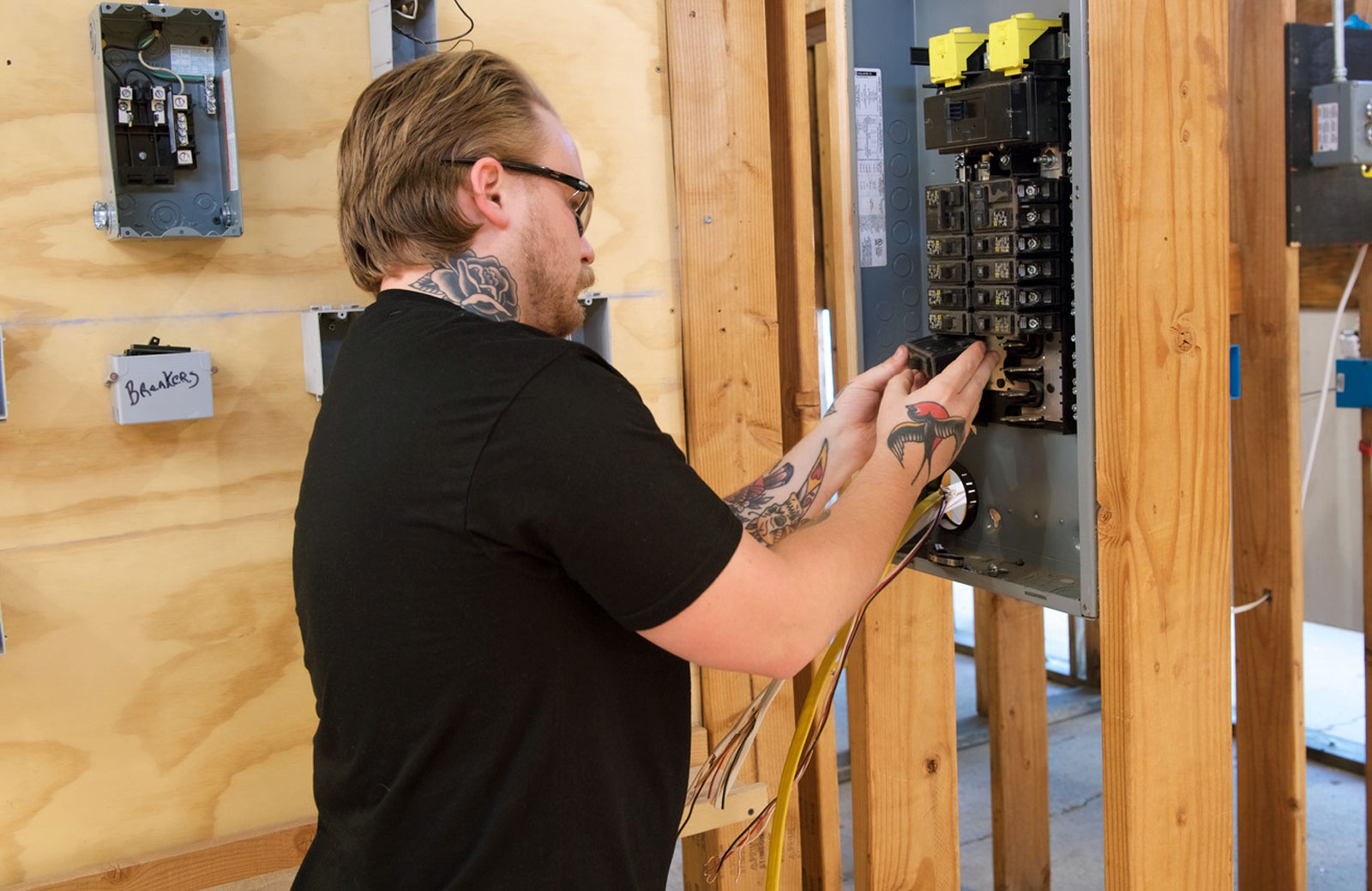
RSI’s electrician training programs offers flexible class schedules for anyone; whether you are just graduating from high school, changing your career, or transitioning from military to civilian life.
We work hard to find the right program and the right schedule to help you succeed. Contact us for more information on upcoming class times and start dates for the Electrical Applications program.
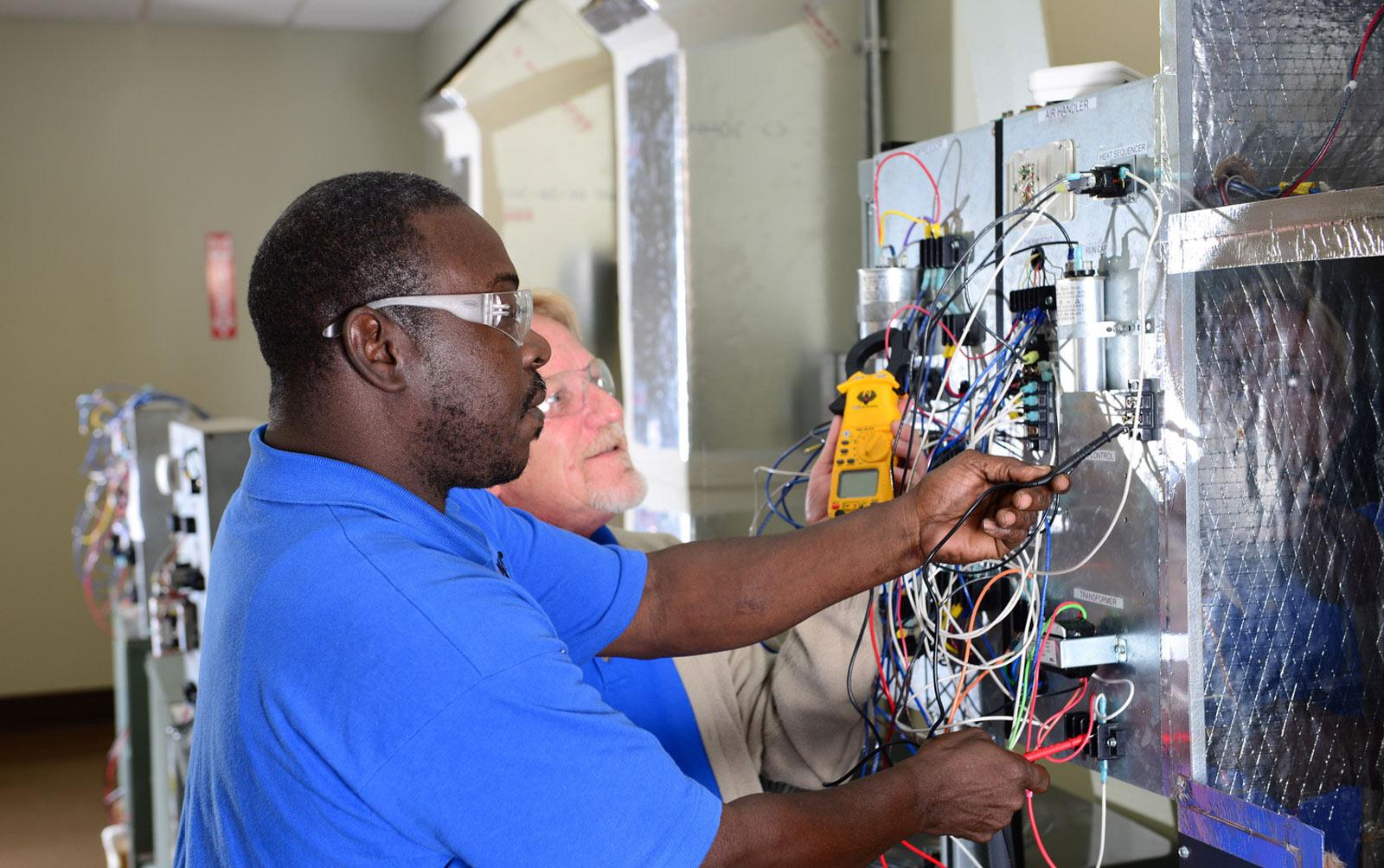
Experiences & Opportunities
Resources for RSI Students
Virtual Tour
Take a virtual tour of our campuses! Explore the classrooms, labs and shop floor with our unique interactive experience.
Employer Partnerships
RSI has partnerships with major employers across the United States and even internationally. Our dedicated Career Services team will be there to support you every step of the way after graduation.
The Right Tools for the Job
When you begin your education at RSI, we provide you with an extensive gear package. You get the high quality professional tools you need to succeed. Ask your admissions representative for more information about the gear package for your program.
Scholarship Opportunities
Learn more about what scholarship opportunities are available and how you might qualify for one. Start the process of applying for a scholarship today!
Electrical Applications Class Start Dates
Class Schedules
- Morning (M-F) 7:00am-12:15pm
- Afternoon (M-F) 12:45pm-5:45pm
- Evening (M-F) 6:00pm-11:00pm
- Weekend (Sat) 8:00am-6:00pm
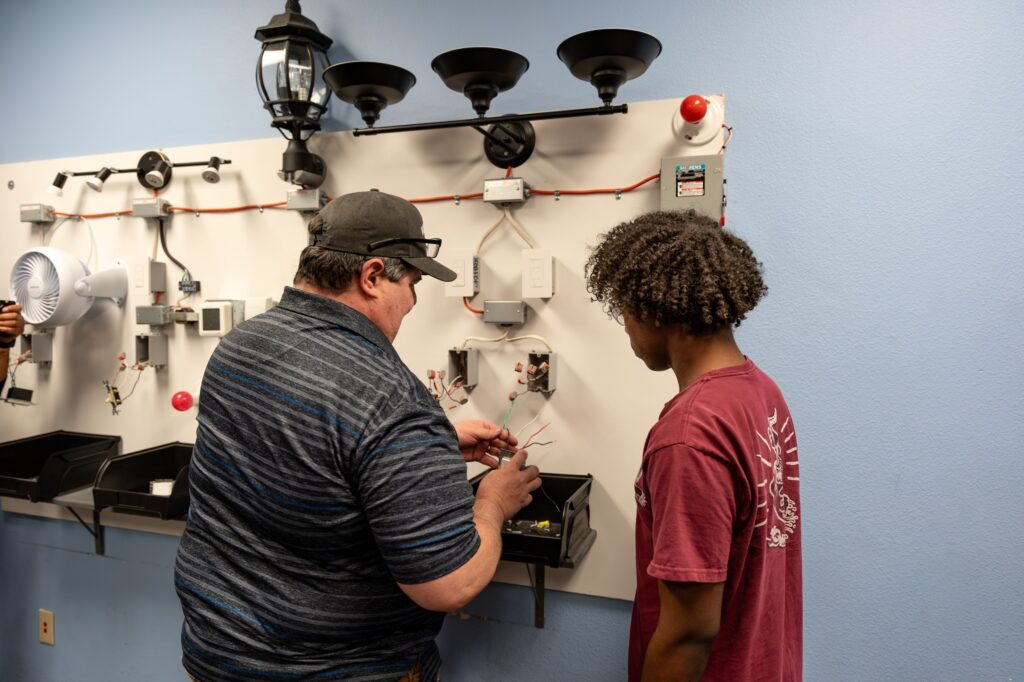
HYBRID INSTRUCTION
At RSI, we know you’re here to build real-world skills, not spend endless hours in a classroom. That’s why we offer a flexible online hybrid model, allowing you to complete the theoretical parts of your program online, as long as it’s done by the deadline. When you’re on campus, your time is spent where it counts: hands-on in the lab with tools, equipment, and expert instructors.
This approach gives you the freedom to balance school with other responsibilities, while still getting the hands-on training you need for a successful career in the skilled trades.

Ready to Move Forward?
All it takes to move forward is making that first step. Whether you need more information, schedule a tour or want to speak to someone, we’re with you every step of the way.
Are YOU ready to change your life?
Listen to these RSI graduates who changed theirs.
We all come from different walks of life, and different circumstances, but it’s the hard work we do and the blood sweat and tears put in to make us who we are today.
The Refrigeration School gave these graduates the structure, confidence, and guidance they needed to make a difference in their lives. It only takes one decision to start the journey on a path towards a better career. A better Life.
Hear the stories of these RSI graduates and how they changed their life:
Michael Gabhart
From hitting rock bottom to owning his own business, Michael was able to take control of his life and be the hero his community needed. RSI was able to guide him on the path to success - Hear his story on how RSI changed his life.
David Mclean
With so many options in front of him and no clear path ahead, David chose to invest in his life and make the decision to enroll at a trade school. TWS gave him the opportunities to be the best version of himself he could be. Professional Welding Graduate from our TWS Jacksonville Campus (Part of the StrataTech Education Group Family of Schools) - Hear his story on how TWS changed his life.
Cody Hudgens
Not basing his chances on luck, Cody took the opportunity of becoming a welder in his own hands after serving in the United States Marine Corps. TWS gave him the knowledge and skills he needed to take his passion to the next level. Professional Welding Graduate from our TWS Tulsa Campus (Part of the StrataTech Education Group Family of Schools) - Hear his story on how TWS changed his life.
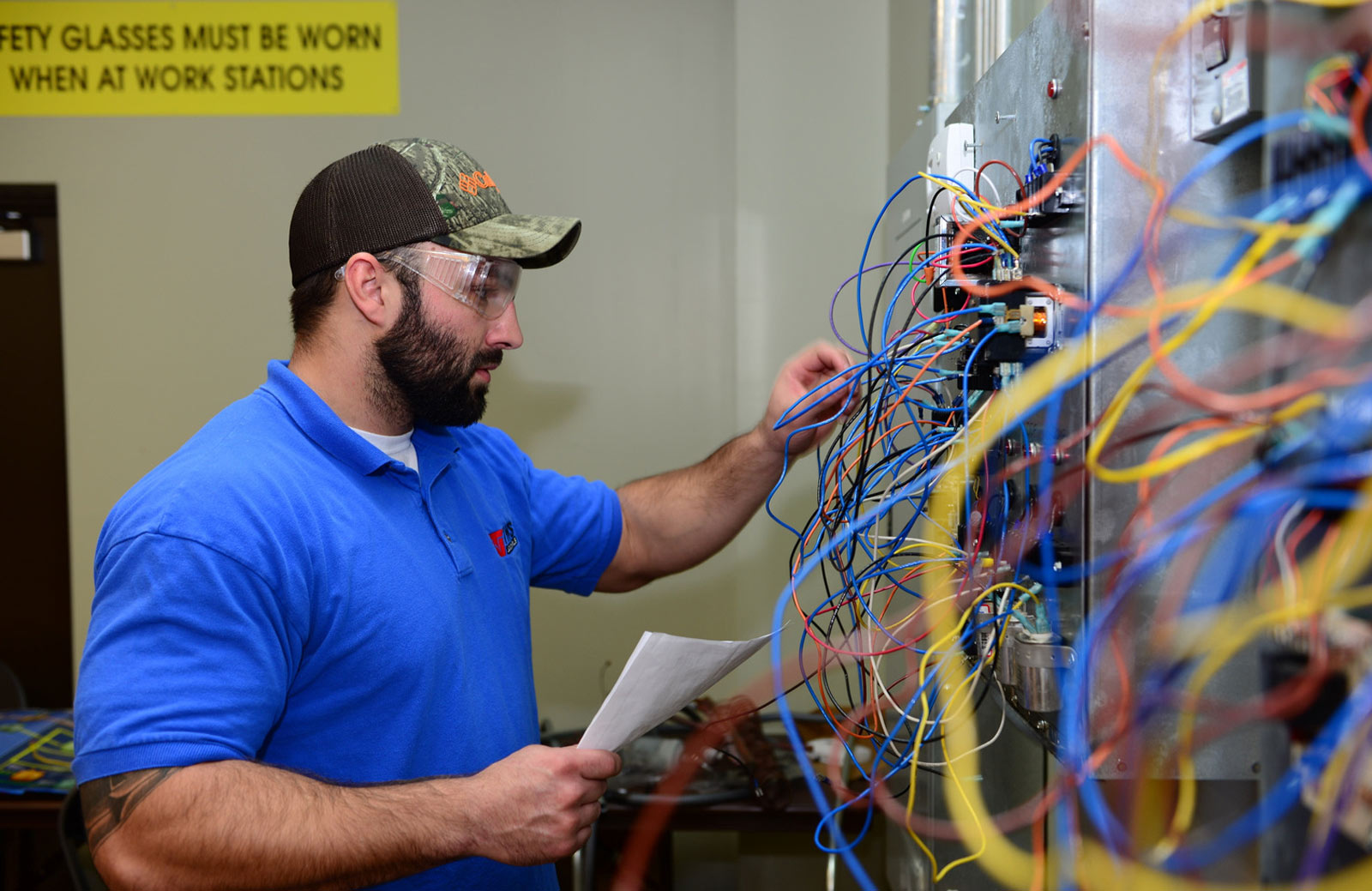
Program Courses for Electrical Applications
Fundamentals of Electricity
HVE100
This HVAC/R class provides The Refrigeration School students with basic electrical understanding from an elemental stage through troubleshooting. Trainers are used to teach schematic wiring as well as test meter usage along with all the safety processes associated with handling electrical systems such as grounding and energized circuits. Students will work with dual voltage systems commonly found in HVAC/R equipment.
The foundation for control circuit wiring and high voltage wiring are discussed and students will put their knowledge to use while working with the trainers. The training material in this HVAC/R class includes information on multiple types of test meters and their proper use, electrical devices, control devices, and troubleshooting. A study of single phase and three phase motors round out the students’ understanding of basic electrical principles.
Requirements
- 4 Semester Credit Hours
- 90 Lecture Hours
- 10 Lab Hours
- 100 Total Contact Hours
- 14.5 Outside Prep Hours
Fundamentals of Solar
HVE110
This module provides an overview of photovoltaic (PV) science and an introduction to the fundamentals of solar energy. Through a combination of lecture, problem solving and hands-on lab exercises, students will learn the concepts and processes of photovoltaic systems, including their design and installation. The module covers the scope of solar energy systems' conceptual, mechanical and electrical design, with an emphasis on wiring and electrical issues.
Requirements
- 4 Semester Credit Hours
- 60 Lecture Hours
- 40 Lab Hours
- 100 Total Contact Hours
- 9.5 Outside Prep Hours
Electrical Wiring – Residential
HVE120
This course introduces the most current version of the National Electrical Code Book to the students as a guide throughout the class. The primary goal of the program is to teach basic techniques of Residential wiring from the standpoint of interpreting all code book requirements. Students will put into practice all that they have learned by wiring a scaled down three bedroom home. A study of electrical safety is provided to ensure a complete understanding of hand tools, ladders, shock hazards, and the personal protective equipment required to work in this field. They will be required to safely place all wiring, circuits, switches, receptacles, lighting fixtures, and GFCI devices in the trainer according to the electrical code.
Requirements
- Prerequisite Course(s): HVE100
- 4 Semester Credit Hours
- 60 Lecture Hours
- 40 Lab Hours
- 100 Total Contact Hours
- 15 Outside Prep Hours
Electrical Wiring – Commercial
HVE130
The Commercial wiring course follows through with concepts learned in the Residential wiring course of training delving deeper into the National Electrical Code book. Students will be tasked with code book interpretation through the study of load calculations, blue print reading, cost estimating, three phase motor wiring, and conduit manipulation. Students will wire commercial lighting and three phase motors as they research the required applications. A mock commercial building will be wired by students in accordance with applicable code using conduit to protect their wiring.
Requirements
- Prerequisite Course(s): HVE100
- 4 Semester Credit Hours
- 60 Lecture Hours
- 40 Lab Hours
- 100 Total Contact Hours
- 20 Outside Prep Hours
Emerging Electrical Applications
HVE145
This course follows through with the knowledge built in Electrical Wiring – Commercial with continued instruction in conduit bending up to 6” trade size using hydraulic bending equipment. This class explains the proper selection of pull boxes and junction boxes, the factors involved in conductor selection and calculations, the proper techniques for conductor installations, as well as the various applications necessary for conductor terminations and splices. Students will continue to advance in their ability to calculate load requirements for branch and feeder circuits in keeping with current standards of the National Electrical Code. This class will also introduce the installation of various voice, data, and video cabling systems.
Requirements
- Prerequisite Course(s): HVE100 & HVR130
- 4 Semester Credit Hours
- 70 Lecture Hours
- 30 Lab Hours
- 100 Total Contact Hours
- 15 Outside Prep Hours
Motors and Lighting Practices
HVE150
This class elaborates on the characteristics of Alternating Current, explaining the behavior of electricity and how it functions in the application of motors, lighting, and the devices that control them. Students will learn the differences between DC and AC motors, Single Phase and 3 Phase applications, calculating the proper sizing of motors, and the selection of the motor controller as well as overload protection. This class also covers the characteristics of light, the handling and installation of various types of lighting (incandescent, fluorescent, high intensity discharge, LED), and the controls used in their operation.
Requirements
- 4 Semester Credit Hours
- 60 Lecture Hours
- 40 Lab Hours
- 100 Total Contact Hours
- 15 Outside Prep Hours
Electrical Distribution Systems
HVE160
This class will describe the operating characteristics of various types of transformers. Using the National Electrical Code, students will calculate transformer sizes for various applications. This module describes the purpose of switchgear, its construction, and maintenance. In this class, students will also understand the importance of overcurrent protection, describe the various types of fuses and circuit breakers in the industry, and select the proper size for specific applications. Students will also apply their knowledge of the proper methods for grounding and bonding according to the requirements of the NEC. This class describes the wiring methods for specific hazardous locations, and also introduces the installation of cable tray systems.
Requirements
- 4 Semester Credit Hours
- 60 Lecture Hours
- 40 Lab Hours
- 100 Total Contact Hours
- 15 Outside Prep Hours
Students Get a Meta Quest 2 loaded with Access to Interplay Virtual Reality Training!
Train remotely. Anywhere. Anytime.
Students of the Electrical Applications program will have the Interplay Learning virtual reality training simulator available to enhance skills learned. Interplay simulates the experience of Electrical and HVAC training via VR to help students learn troubleshooting techniques, even when they’re away from school. A Meta Quest 2 is part of the gear package for this program, and Interplay Learning is included as part of the course materials for all students.


